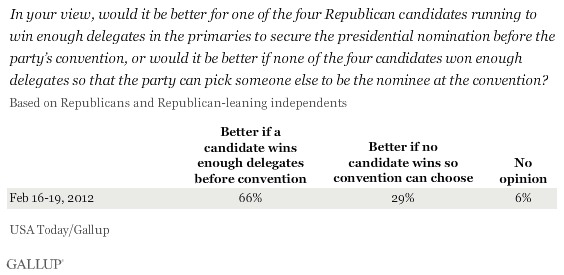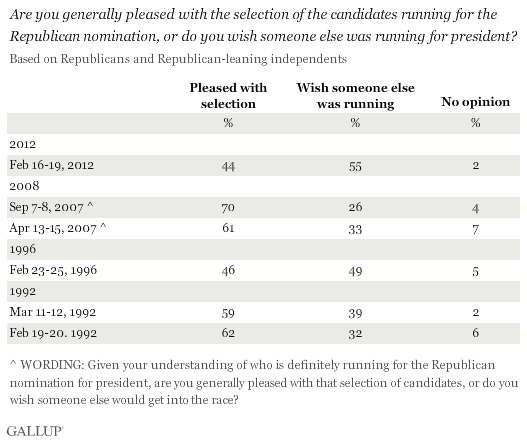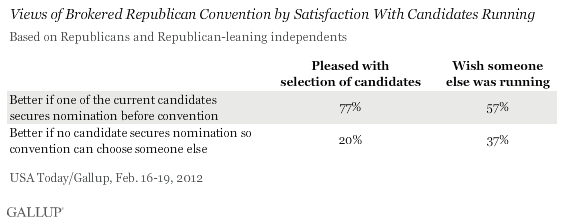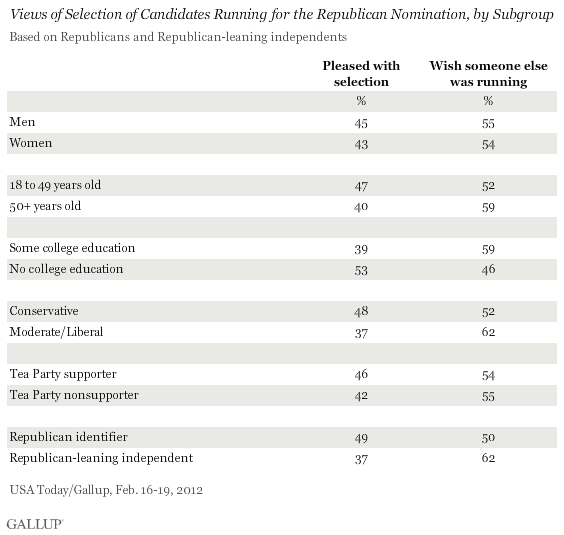PRINCETON, NJ -- Republicans by a better than 2-to-1 margin would prefer that one of the four remaining GOP presidential candidates win enough delegates in the primaries and caucuses to secure the nomination, rather than having a brokered convention that could then choose another person to be the party's presidential nominee.

Republicans prefer to avoid having the presidential candidate chosen at the convention even though a majority say they wish someone else was running for the party's nomination. Forty-four percent are pleased with the selection of candidates. These results are based on a Feb. 16-19 USA Today/Gallup poll.
The current level of satisfaction is similar to what Gallup measured during the 1996 campaign, when Republicans were also generally ambivalent toward contenders for the party's nomination. They were much more likely to be satisfied with the field of candidates in the 1992 and 2008 campaigns, with the 1992 campaign including incumbent George H.W. Bush.

Notably, even a majority of those displeased with the current roster of GOP candidates nonetheless say it would be better for the nomination to be decided prior to the convention.

Republicans' reluctance to support a brokered convention could result from a respect for the process and the rules that govern the nomination choice. It may also stem from a belief that a brokered convention could damage the party even though it could fulfill their wish of having someone outside of the four current candidates be the Republican nominee.
Moderate, More Educated Republicans Less Pleased With Field
For the most part, key subgroups of Republicans are more dissatisfied than satisfied with the current crop of candidates for the party's 2012 presidential nomination. But some groups are more likely to be dissatisfied than others, including moderate or liberal Republicans (62%), Republican-leaning independents (62%), those with at least some college education (59%), and those aged 50 or older (59%). Tea Party supporters' satisfaction is similar to nonsupporters' satisfaction.

Some groups that tend to show higher dissatisfaction, including Republican leaners and moderate or liberal Republicans, probably have weaker attachments to the party and may be more likely to prefer a wider selection of candidates in general.
Republicans Do Not Believe Prolonged Campaign Is Hurting Party
Most of the recent Republican nomination campaigns were effectively over by the Super Tuesday primaries, if not earlier. However, it is unlikely that one candidate will win enough primaries and caucuses between now and Super Tuesday on March 6 to clinch the nomination, because of a reduction in the number of winner-take-all contests and because of the competitiveness of the campaign to date. As a result, the 2012 nomination contest likely will be the longest for the GOP since the 1976 Gerald Ford-Ronald Reagan showdown.
There is a risk that the ongoing nomination campaign could damage the party as the Republican candidates continue to point out their competitors' shortcomings rather than focusing their criticisms on Obama. While many Republicans do believe that the continuing campaign is hurting the party, this is not the majority view -- 57% say the extended campaign is not hurting the party, while 40% say it is.
Implications
The general uneasiness with the field of 2012 Republican presidential candidates could be a reason Republicans' preferences have shifted so much during the course of the campaign. Five different candidates -- Mitt Romney, Rick Perry, Herman Cain, Newt Gingrich, and Rick Santorum -- have led or been tied for the lead at various points in the campaign since early last summer, when most officially announced their candidacies. Santorum currently leads the field of the four remaining candidates, which also includes Romney, Gingrich, and Ron Paul.
But the level of dissatisfaction is not so great that Republicans are hoping for a situation -- a brokered convention -- that would allow another person to be the Republican candidate for president this fall. Nor do Republicans seem overly concerned that an extended nomination fight will harm the party.
Track every angle of the presidential race on Gallup.com's Election 2012 page.
Survey Methods
Results for this USA Today/Gallup poll are based on telephone interviews conducted Feb. 16-19, 2012, with a random sample of 481 Republican and Republican-leaning independents, aged 18 and older, living in all 50 U.S. states and the District of Columbia.
For results based on the total sample of Republicans, one can say with 95% confidence that the maximum margin of sampling error is ±6 percentage points.
Interviews are conducted with respondents on landline telephones and cellular phones, with interviews conducted in Spanish for respondents who are primarily Spanish-speaking. Each sample includes a minimum quota of 400 cell phone respondents and 600 landline respondents per 1,000 national adults, with additional minimum quotas among landline respondents by region. Landline telephone numbers are chosen at random among listed telephone numbers. Cell phone numbers are selected using random-digit-dial methods. Landline respondents are chosen at random within each household on the basis of which member had the most recent birthday.
Samples are weighted by gender, age, race, Hispanic ethnicity, education, region, adults in the household, and phone status (cell phone only/landline only/both, cell phone mostly, and having an unlisted landline number). Demographic weighting targets are based on the March 2011 Current Population Survey figures for the aged 18 and older non-institutionalized population living in U.S. telephone households. All reported margins of sampling error include the computed design effects for weighting and sample design.
In addition to sampling error, question wording and practical difficulties in conducting surveys can introduce error or bias into the findings of public opinion polls.
View methodology, full question results, and trend data.
For more details on Gallup's polling methodology, visit www.gallup.com.
